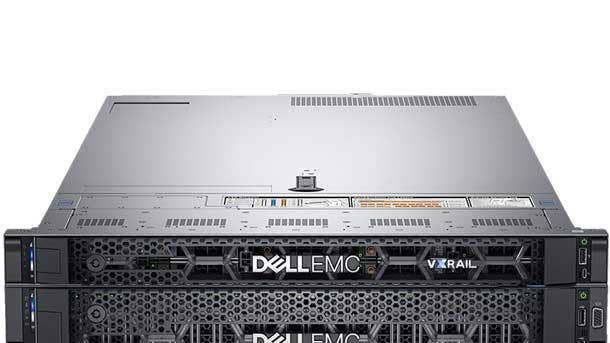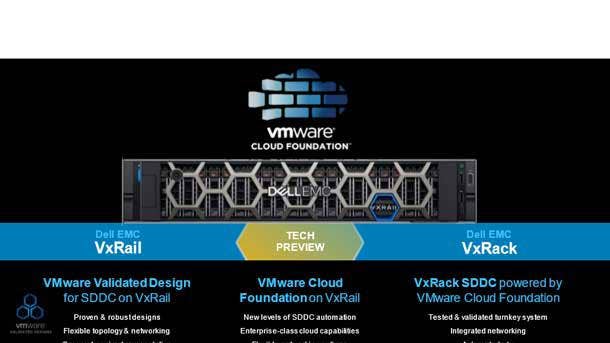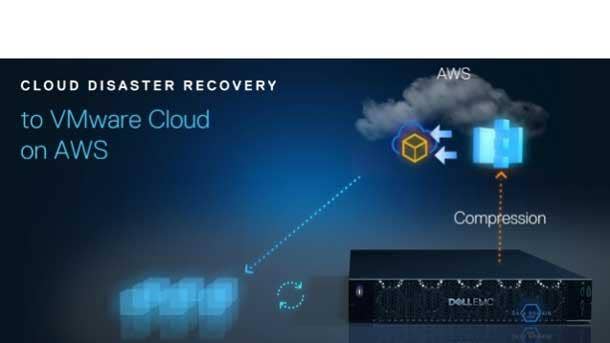Dell’s New Cloud Offerings: 5 Things Partners Need To Know
CRN breaks down how partners can drives sales around Dell Technologies’ new Cloud Platforms and Cloud Data Center as a Service launched Monday at Dell Technologies World.

Dell Doubles Down On Cloud
Over the past 18 months, Dell Technologies leaders from VMware CEO Pat Gelsinger to Jeff Clarke, Dell’s vice chairman, products and operations, have spent countless hours formulating a strategy to create a singular vision of Dell Technologies’ cloud blueprint.
Following the blockbuster acquisition of EMC for $67 billion in 2016 and the stringent integration process that followed, Matt Baker was asked to step up to the plate to craft easily consumable cloud offerings.
“Jeff turned to me and said, ‘Look, we need to build out our cloud strategy and extend it. And we need to do it in such a way that we’re leveraging the full power of Dell Technologies,’” said Baker, senior vice president, Dell EMC strategy and planning, in an interview with CRN.
Dell’s bullish cloud strategy was revealed at Dell Technologies World 2019 in Las Vegas Monday with the launch of the Dell Technologies Cloud Platforms and Cloud Data- Center-as-a-Service offerings. Here are five things partners need to know about Dell Technologies’ new cloud offerings and how to sell them.

Dell Technologies Cloud Platforms
Key Products Inside: VMware Cloud Foundation, VxRail
Additional Product Options: Dell EMC servers, storage and networking products
The centerpieces of the on-premises Dell Technologies Cloud Platforms are VMware Cloud Foundation, which provides integrated cloud infrastructure and management services to run applications in both private and public environments, and the company’s hyper-converged infrastructure offering, VxRail.
In addition, Dell has validated designs to build Dell Technologies Cloud Platforms using traditional Dell servers, networking and storage arrays inclusive to Dell EMC Unity and PowerMax. “So it’s not just hyper-converged, it’s traditional infrastructure as well,” said Baker.
The Dell Technologies Cloud Platforms have the flexibility to meet a variety of workload and performance needs as well as the ability to migrate workloads seamlessly between public and private cloud using familiar VMware tools. The offering was jointly engineered with VMware to be the simplest and fastest hybrid cloud to deploy in the industry.

How To Sell Dell Technologies Cloud Platforms
Partners can sell the Dell Technologies Cloud Platforms in a variety of different sales motions including Capex and Opex. “All of those elements are available to buy, rent, lease and consume as a service,” said Baker.
Dell is backing the new cloud platforms with its popular Dell Financial Services (DFS) arm. Customers can buy the cloud platforms in one of three flexible consumption solutions: Pay as You Grow, Flex on Demand and Data Center Utility. Flex on Demand allows customers to acquire elastic capacity and only pay for what they use, while Data Center Utility establishes a pay-per-use environment across the entire IT infrastructure. DFS’ Pay as You Grow includes customized payment solutions to support forecast growth, flexible deployment schedules, deferrals and preprovisioned upgrades.
Partners can also layer on top of Dell Technologies Cloud Platforms other technologies from inside the Dell Technologies family of businesses, which includes VMware, RSA, SecureWorks, Boomi, VirtuStream and Pivotal. “Layering on top of this Dell Technologies Cloud platform can be Pivotal, leveraging the underlying PKS [Pivotal Container Service] that is present on the Dell Technologies Cloud solution set,” Baker said.

Dell Technologies Cloud Data Center as a Service (VMware Cloud on Dell EMC)
Key Products Inside: VMware Cloud Foundation, VxRail, VMware management
Dell Technologies’ new Cloud Data Center as a Service is a consumption-based management service for VMware Cloud on Dell EMC infrastructure. The core ingredients inside are VMware Cloud Foundation, VxRail and a VMware Cloud service management layer. The offering stems from Project Dimension, which extended VMware Cloud to deliver software-defined data center infrastructure and hardware as a service to on-premises environments with built-in technologies including vSAN and SAN SD-WAN by VeloCloud.
The company’s Data-Center-as-a-Service offering is fully managed by Dell Technologies and can be sold by channel partners. The service will be sold as a monthly subscription with no Capex outlay on one- or three-year agreements with consumption-based availability similar to how VMware Cloud on AWS is sold.
“The VMware Cloud on AWS service can be consumed on demand—you swipe a credit card and pay for it by the period—but the vast majority of cloud consumption after initial experimentation is finished is reserved instances. So you can purchase one-year, three-year reserved instances. The same is true for VMware Cloud on Dell EMC,” said Baker. “So you purchase a reserved instance of capacity and that capacity starts initially with a three-node cluster, with a two-node cluster to come, and you can add to that cluster and you purchase reserved instances of that service. Because of our global capabilities, we’re able to ship, install, light up and provision those systems and make them available to customers within standard lead time, which can vary between under a week to 10 days.”

Partner Sales Opportunity For Cloud Data Center as a Service (VMware Cloud on Dell EMC)
Partners will be able to start selling Dell Technologies Cloud Data Center as a Service in the second half of 2019. Although the offering is fully managed by Dell Technologies, the company said it opens the door for channel partners to provide higher-level professional services and consultancy for customers to drive hybrid cloud sales.
One big opportunity for new VMware Cloud on Dell EMC customers is around disaster recovery (DR), according to Baker. “One of the most popular uses of a platform like this is disaster recovery services. DR services can be very difficult and costly to test, and because of those two things, reliability of DR tends to be subpar. The idea of building, testing and operating DR services is something that our customers are looking for and our partners are very interested in helping design and deliver,” he said.
Other key revenue opportunities for partners are to design and build applications in the new VMware Cloud on Dell EMC environment as well as providing workload assessments. “One of the beauties of this platform is that an application designed to run in an on-premises cloud environment is able to instantly run in the off-premises environment like VMC on AWS for example. That’s a good thing, but the challenge is can the application operate across a stretched geographic area? What are the challenges with latency, etc., in the design of that application? So workload assessment is still required in the cloud work. There’s a ton of opportunity built around that,” said Baker. “[Partners] can focus on those more valuable business-impacting services to our customers—and that’s where our channel partners excel.”

What’s The Main Difference Between The Two New Cloud Offerings?
The physical instantiation of both Dell Technologies Cloud Platforms and Cloud Data Center as a Service—which each leverage VxRail and VMware Cloud Foundation—is virtually identical. The main difference between the two offerings is Data Center as a Service is managed by Dell with additional VMware management capability, while the Cloud Platforms is managed by the customer.
“The difference largely between the two is one is a fully managed service that you don’t touch the equipment, it’s managed for you and you don’t issue tickets or swap hardware drives. In fact, you never touch that platform, you simply consume it, that’s the Data Center as a Service element. The Dell Technologies Cloud Platforms is where you buy and manage it on your own like what most people are doing today on-premises,” said Baker. “The common layer between the two is that management framework—that very familiar VMware operational environment. So one is fully managed and one is customer managed. Partners can sell all of this.”
Baker said channel partners now have “well-oiled hybrid cloud” offerings from Dell Technologies that allow them to provide “higher-order” solutions for customers. “Rather than focus on assembling boxes and whatnot, we can focus on where business value is delivered, which is at the higher-order, business continuity, application design, digital transformation [level],” said Baker. “All of our partners are looking to be more strategic business partners to their customers and this gives our channel partners a hybrid cloud operating platform that allows them to focus on those high-order, business imperatives that are technology fueled versus just core compute and storage services.”